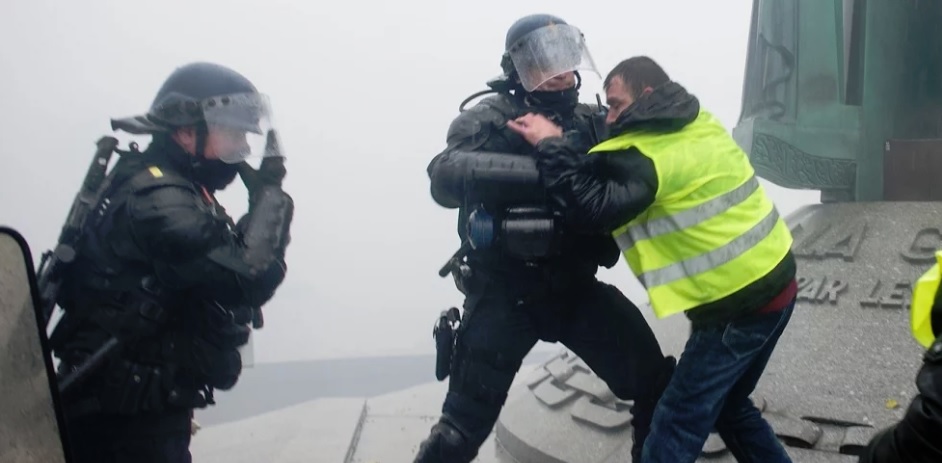For the last 4 weeks, thousands of protesters in France have rallied against the government in a cause that has become known as the “yellow vest” movement, a reference to the safety vests that French drivers keep in their cars. Protests are a common occurrence in France, the country has a long history of protests and revolution. But the yellow vest protests led to some of the worst rioting in Paris and forced authorities to shut down parts of the city. After four weeks of protests Emmanuel Macron in a televised address to the nation was forced to scrap a number of polices and promise minimum wage rises. It was the first time the French president backed down on a policy decision. The protests come at a time when Macron’s popularity has fallen to record low, but it is also the first occurrence of people taking to the streets after a decade of austerity, where the masses were punished due to the excesses of the elite.
Comment:
Since becoming president in May 2017, Macron cut taxes on companies, reduced public spending and eased the tax burden on the rich. This damaged Macron’s image leading to him being termed the president of the rich. A planned fuel tax increase to begin in 2019 was the final straw for many. Demonstrations began in France on 17 November 2018 and rapidly spread. Rising fuel prices, the high cost of living and claims that a disproportionate burden of the government’s tax reforms were falling on the working and middle classes. Ever since the global economic crisis in 2008, governments in the West bailed out the banking industry, whilst cutting expenditure on social programs under the guise of austerity.
Wealth in France is highly concentrated among the richest. The top 1% of the population own 23% of French wealth. A mere 10% of France’s richest own 54% of the nation’s wealth. Half of France’s 67 million population share in only 6.3% of the country’s wealth.[1] Despite France’s social security system, income is taxed at 48% which leaves little in disposable income for French workers. France like much of the Capitalist world has deep wealth inequality. Successive Presidents have protected the wealth of the rich at the expense of the vast majority of people in the country. Living standards and wages rose in France after World War II during a 30-year growth. Pay gains for low and middle-income earners continued through the early 1980s. But those dynamics unravelled as successive French governments restricted wage gains, but cut taxes for France’s wealthiest taxpayers. Macron did away with a wealth tax that applied to many assets of France’s richest households, replacing it with one that applied only to their real estate holdings.
It is these facts that have drawn so much support for the yellow vest movement. Starting online in October 2018, the movement attracted hundreds of thousands of online supporters in small rural towns and struggling towns in northern France. Active Yellow Jackets include the unemployed, low-income pensioners and single parents struggling on welfare or the minimum wage. They also include blue and white-collar workers and small entrepreneurs who are somewhat better off but feel harassed or cheated by taxes and high prices. Like many voters in the Brexit referendum in the UK, the Yellow Jackets believe they have been betrayed by decades of neglect and exploitation by mainstream politicians obsessed with pleasing the rich. One French journalist described the situation in the following way: “The French people have endured consistent and cumulative cuts to living standards over the course of the last twenty years. The French are a practical people and they tightened their belts as much as they could until eventually, they found they could no longer survive.”[2]
France was always presented as a great country to go on holidays, to enjoy culture, food and natural landscapes, but it appears a different place when you have to live and work there. After a decade of austerity and decades of polices which favoured a small rich elite, many in France have had enough and protested in the streets. Across the western world, many turned to right-wing and unconventional parties as the mainstream parties ceased to represent them. In the election over 15 months ago, Marine Le Pen from the far right received significant votes for her polices and many saw her as an alternative to the mainstream politicians. Despite her loss, her significant support shows for many French, the system no longer serves them.
Adnan Khan
Notes
[1] https://wir2018.wid.world/part-4.html
[2] https://www.thejournal.ie/readme/opinion-it-is-not-just-about-petrol-prices-years-of-austerity-in-france-caused-violent-protests-4375243-Dec2018/

